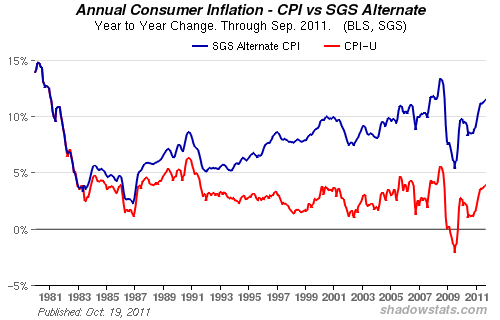With all of the problems in Europe, protests on Wall Street, and middle east conflicts over the last year, something that has escaped scrutiny by prime time media stars and the general population is the consistent rise in prices across all consumer goods and services. While the Federal Reserve says they have inflation under control, their continued intervention into the financial and monetary systems of the global economy is leading us down a road that may very well lead to high inflation rates similar to those we saw in the 1980′s, or perhaps something much, much worse.
For the Federal Reserve, policymaking these days is about deciding which of two imposing evils to take on – a decidedly moribund economy or the increasing threat that inflation poses to battered consumers.
For much of the slow slog out of the financial crisis, the Fed which is meeting this week and will issue its policy statement Wednesday, has managed to train its gaze on jump-starting growth through its various quantitative easing measures.
But recent indicators show that inflation is posing an equally daunting threat that further monetary accommodation from the Fed might serve only to aggravate.
The pressure has come primarily through measures that Fed Chairman Ben Bernanke likes to call “transitory” – namely, the volatile but steady rise offood and energy prices that don`t make up core inflation measures but usually impact consumers more.
Economists increasingly believe that while the so-called core Consumer Price Index (CPI) measure has remained around the 2% level that pleases the Fed, headline inflation that includes things such as groceries and gasoline is becoming a growing menace. The more inclusive inflation measure is at 3.9% and hammering at consumers, including the 14 million who remain unemployed.
…
“Because of the level of debt that we have in this country and indeed over in Europe as well, market forces demand deflationary depression to occur,” said Michael Pento, president of Pento Portfolio Strategies and economist at Agora Financial. ”
But because we have such an activist Federal Reserve and central bank in Europe, every time they step into manipulating the market by depreciating the currency, we have these huge spikes in inflation.”
…
Pento advises investors to disregard pronouncements from the Fed that inflation is under control.
“They`re being mendacious,” he said. “They are trying to fool you into believing that inflation is not a problem.”
Source: Money Control
As of this month, we have reached Ben Bernanke’s 2% threshold for the official Consumer Price Index measure. The CPI-U (Urban measure, which includes food and energy) has reached 3.9%. And those are the official numbers.
Unofficially, if inflation was calculated the same way as it was in 1990, the CPI would show a staggeringly different number.
According to Shadowstats, we are now seeing price inflation rates of over 11% – almost three times higher than the official numbers.
Perhaps Ben Bernanke, Tim Geithner and President Obama don’t see it, but consumers are certainly feeling its effects. As a result, even though Americans’ wages are stagnating in nominal terms, they continue to spend money, which has analysts wondering what’s going on. They conclude that we’re spending more as a direct result of Federal Reserve machinations:
Americans are making a little more money and spending a lot more.
Under normal circumstances, that would be a troubling sign for the economy. But a closer look at some new government figures suggests another possibility: People are saving less money because they’re earning next to nothing in interest.
Saving is already difficult because of more expensive gas and food. It’s even tougher because of the lower returns — the flip side of super-low interest rates that the Federal Reserve has kept in place since 2008 to help the economy.
Critics say the Fed is punishing those who play by the rules — those careful enough to set aside money for savings or people who built up a nest egg and are living on fixed incomes that depend on interest.
Source: ABC News
What choice are people left with? They may not be consciously aware that inflation is over 10%, but their pocket books sense it. Why leave money sitting in a bank account when your cash savings will be decimated within a year? Equity investment has become too risky, with markets swinging 2% – 3% daily. This leaves only one option.
Spend.
